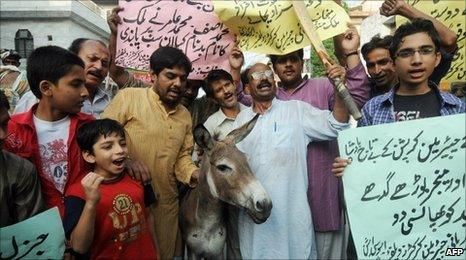Pakistani anger at another cricket scandal
- Published

People angry at the reported betting scam named donkeys after the players accused and pelted them with rotten tomatoes to show their anger
These fresh allegations against Pakistani cricketers could not have come at a worse time.
For years, Pakistan has been in the news for its role in militant conflict in South Asia.
Over the past month, it has made international headlines due to the worst floods it has faced in nearly a century.
The floods highlighted the extreme inequalities of Pakistani society, and the apathy or inability of its administration to deal with the challenge.
And now the betting scam allegations against Pakistani cricketers have added to already low national morale.
'Shot dead'
And people are angry.
"They are all crooks. They should be shot dead," says one worker at a car wash in Islamabad.
In Lahore people vented their anger by naming four donkeys after the accused players, and then pelting them with rotten tomatoes.
A banking executive, Fawad Ali, is more cautious.
"Given their history, some of them may have been involved, but we must not deliver a judgement until we know for sure."
A few even blame the English press for being biased against Pakistani cricketers.
"Every time they go to England, they are dragged into one controversy or another. Sometimes it's ball tampering, sometimes match-fixing," says Gul Badshah, a veteran cricket fan from the north-western city of Peshawar.
Disrepute
But after the number of incidents involving the team, few in Pakistan are certain that Pakistanis are entirely clean.
There have been questions about Pakistan's conduct in the past
"Questions about the team have been going on for a long time," says Kalim Mirza, a business executive and keen follower of Pakistani cricket.
In 2006, umpire Darrell Hair accused the Pakistan team of ball-tampering and Pakistan refused to finish the match
Captain Inzamam-ul-Haq was found guilty of bringing the game into disrepute.
Following a disastrous tour in Australia last year, the International Cricket Council (ICC) and the Pakistan Cricket Board (PCB) ran investigations into the team's conduct.
Tour captain Mohammad Yousuf and former captain Younus Khan were banned indefinitely. Shoaib Malik and Rana Naved al-Hasan were banned for a year. Shahid Afridi, and brothers Umar and Kamran Akmal were fined and placed on probation.
Yousef announced his retirement from the international game, but was allowed back into the team by the PCB after a big defeat by England at Trent Bridge.
So the new allegations have surprised no one.
'Shame'
But many are incensed because, as one dejected cricket fan puts it, in a land where no news is good news, cricket is the only source of pride and unity.
And this pride - or the loss of it - has been felt at the highest level.
"This episode has made us hang our heads in shame," Prime Minister Yousuf Raza Gilani commented during an address on Sunday.
President Asif Zardari "expressed disappointment" over the reported betting scam and "asked for details of the case and any inquiries that may have been initiated in London", his spokesman, Farhatullah Babar, told the 大象传媒.
Interior Minister Rehman Malik has now set up a three-member federal investigation team which is expected to leave for London shortly to conduct its own inquiry.
Meanwhile, Pakistan's parliamentary committee on sports went into special session on Monday afternoon to consider the issue and formulate a response.
The head of the committee, Iqbal Mohammad Ali, has said that all those involved should be banned for life.
'Bad guys'
Former cricketers are also disconcerted.
"Everyone who is involved (in the scandal) should be banned for life, because they have got no shame," a former Pakistani cricketer, Sarfraz Nawaz, said in comments to a local TV channel.
Many in Pakistan say the PCB is being too lenient on the players.
"Everybody is saying the bad guys should be sent home, but they (the PCB) didn't do that after what happened in Australia last year," says Asad Ali, a government employee.
Fining players would not be enough, he says.
Perhaps this is what a former Pakistani cricket captain, Imran Khan, had in mind when he said the loss to cricket, if the reports were true, would be immense.
"The people who are found guilty should be removed from the team and replaced, and should be punished as an example for the future generations to realise that crime does not pay."
- Published30 August 2010
- Published30 August 2010
- Published30 August 2010